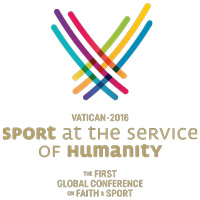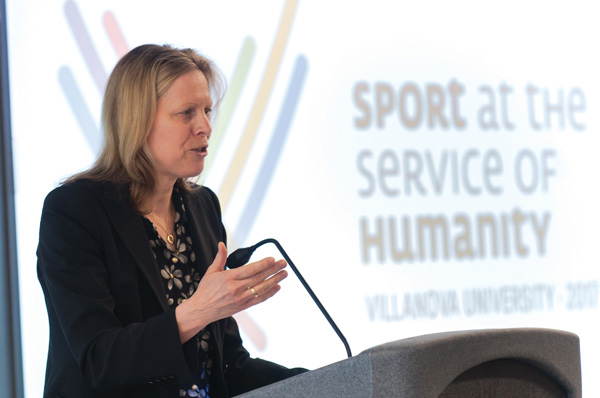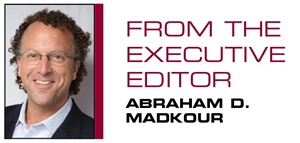Eight months to the day the Vatican concluded its inaugural conference on Sport at the Service of Humanity, Big East Commissioner Val Ackerman stood in a new conference room at Villanova University and asked a simple question: “What can we do to bring out the best in our young people?” Ackerman was leading the first conference to build on the October event in Rome, which centered on six core principles — compassion, respect, love, enlightenment, balance and joy — to enhance the greater good through sports. The two-day meeting, hosted by Villanova’s Office of Mission and Ministry in conjunction with the Big East, focused solely on intercollegiate athletics. More than 100 leaders representing 28 colleges and universities from largely Catholic schools gathered to tackle the broad but admirable goal of bringing out the best in today’s student athletes by harnessing the power of sport and the role it can play in the educational and personal development process.
 |
I attended the October conference, in which Ackerman played a key role in developing, and was very pleased to see her carry the torch forward. The agenda of the two days was rooted in how college sports can teach values and improve lives, as Ackerman stressed developing the “whole person” — mind, body and spirit. The event was held in the recently renovated Inn at Villanova, which sits a mile from the main campus and had opened just days before the event, and provided a serene, contemplative environment, with floor to ceiling windows looking out over a peaceful green. The school’s president, Rev. Peter Donohue, a cheery, effusive character with a wide smile, kicked off the event with an honest understanding of the pressures on today’s athletes. “We ask a lot of them,” he said. “We ask them to be so good at so many things — we ask them to be great in athletics, at academics and to be great in the community. So, we have the responsibility to help and protect them.” Donohue’s theme was continually reinforced, as his athletic director, Mark Jackson, shared his goal of developing the “complete student athlete.” “The complete piece is the one I am most concerned about,” he said. “Graduation is, of course, good. But we want student athletes to explore themselves, to become comprehensive student athletes.”
Vatican plans mix of global,
regional conferences
The conference on college athletics was the first one building off the Vatican’s inaugural event in October. Monsignor Melchor Sanchez de Toca y Alameda, who came over from Rome to attend the two days, said the Vatican is in talks with other sports organizations that share the philosophy of the Sport at the Service of Humanity (SSH) movement. “We are talking to big clubs and leagues, looking for them to be partners and integrate these principles into action,” he said.
Sources said plans to build on Pope Francis’ vision for Sport at the Service of Humanity will be manifested through a series of global conferences bringing together world leaders in faith and sport. These conferences, ideally annually, will be supplemented by regional events that will focus on a specific sport, like the Villanova event, or across sports in a region, as there’s been talk of an event in Mumbai in 2018 around cricket, squash and field hockey. A professional sports conference in the U.S. and an event with the International Olympic Committee at the Youth Olympic Games in Buenos Aires next summer are also in development.
Bernie Mullin’s The Aspire Group has been retained by SSH to obtain funding, sponsors, as well as to assist in long-term strategic planning.
Bishop Paul Tighe of the Pontifical Council for Culture at the Vatican was pleased that the dialogue was continuing from the initial event in October. “We understand that these are broad principles that are hard to put in action or make applicable to everyone with different agendas,” he said. “But we are trying to bring together like-minded voices to build awareness of our shared interests of accountability around integrity and ethics.”
— Abraham D. Madkour
I was only able to take in one day of the conference, which included a Vespers service and a group dinner at the recently completed O’Dea Lounge overlooking Villanova Stadium, but the earnestness to drill deep into important, yet at times theoretical, issues was encouraging. Much like in Rome, small groups discussed specific issues, with the key suggestions presented back to the full group. Topics included what can be done to provide greater balance, development and even joy to the student-athlete experience, with so much pressure on them academically, athletically and in the community. Another topic focused around greater inclusion, removing the isolation of today’s top athletes from the rich experiences of college life. Some campus officials expressed dismay that athletes weren’t part of the full fabric of a university or interacting with other students.
Administrators cautioned against the “football-ization” of today’s coaches and athletic programs specific to practice schedules, training and other full-time demands. Discussions explored the potential value in easing up on the time demands and training for athletes, which could potentially stimulate performance. The Catholic institutions questioned the need and value of playing games on holidays such as Christmas or Christmas Eve, while officials from BYU extolled the benefit for their students by their institution’s refusal to play on Sundays. While many praised NCAA guidelines allowing for student athletes to take part in internships or study abroad programs, some felt that benefit would be impeded by coaches looking to get the maximum time and energy out of their athletes. Finally, there was discussion on better amplification and PR around the work done by athletic programs in the community, and even a national day of service by student athletes was broached.
 |
The Big East’s Val Ackerman is carrying the torch forward.
Photo by: JOHN WELSH / VILLANOVA UNIVERSITY
|
It’s easy to understand and admire the goal of the conference. But as was stressed, specific action plans and implementation of those will be far more challenging. College athletics is a broad, diverse canvas of agendas and resources, with more than 1,000 athletic programs and 460,000 student athletes. It’s difficult to compare the experience of a Notre Dame football player to a University of Dayton tennis player. The missions and the values of the institutions, athletic departments, coaches and athletes, differ dramatically. Even what the student athlete wants is not clear — for every athlete that wishes to take greater advantage of campus life, there is one who wishes to only focus on athletics. But program leaders were undaunted and committed to forming a working group to build out some of the ideas specifically discussed. The notion of sports as just one component of an individual’s education and personal development is sound, and it’s often lost amid the pressures of commercialism and the zeal to win. Ackerman and her colleagues are continuing to push the dialogue forward, and that’s half the battle.
Abraham D. Madkour can be reached at amadkour@sportsbusinessjournal.com






